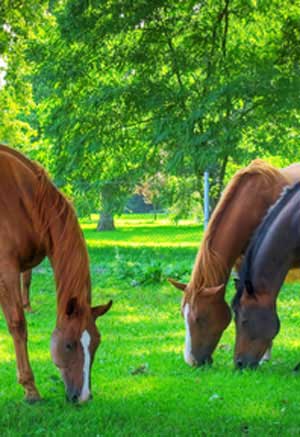Equine Parasitism

Written by Preston Hickman, DVM, Wichita Equine and Sports Medicine
Extensive and irreparable damage can be caused by heavy infestations of internal parasites. At the very least internal parasites rob your horse of nutrients, cause gastric irritation, un-thriftiness, and lower the animal’s ability to fight off disease. At their worst internal parasites are capable of producing colic, intestinal rupture and death in some cases.
Judicious use of deworming agents on a regular schedule and in combination with good pasture management will virtually eliminate the potential for serious complications caused by parasitism. A good parasite control program is probably second only to supplying your horse with plentiful clean water and top-quality feed. A parasite control program is aimed at prevention before they attack the horse. Since parasites are primarily transferred through manure, proper pasture management is critical and should be the first line of defense in a parasite control program.
Grazing behavior and movement patterns have led to an understanding of the horse’s ability to avoid parasitism. Recent research has increased our understanding of the horse’s development of an acquired immunity to parasitism. This understanding has led to current recommendations such as grouping practices based on age, rotational grazing strategies, cross grazing strategies, and pasture grooming recommendations. Though current research has greatly increased our knowledge of equine behavior, the ability to predict the behavior of the infective stage larvae will be needed to eliminate parasitism in the future.
Parasites over time have also become very adept at avoiding destruction by dewormers. Most parasites must undergo several molting stages before they become infective. Therefore, it is important that we understand the lifecycle of the parasites so that we can intervene at opportune times. With this strategy, we can impact the greatest number of infective larvae horses are likely to consume. Until recently, horses were dewormed every two months or at least four times per year. However, current recommendations are based around egg counts expressed as eggs per gram of feces. Utilizing the fact that only 20% of the animals on a pasture are accounting for greater than 90% of the parasites being ingested it is clear why this method would be more judicious and have the greatest impact on parasite resistance. Our current animal husbandry and housing practices make it realistic in many cases to maintain fecal egg counts on individual horses. Although it should be stressed, a negative egg count or a low egg count does not imply a parasite free horse. Some parasites throughout their lifecycle cause more damage in their immature stages than they do as adults (when they would be shedding eggs). Because of this factor, timing is critical to preventing extensive damage. Understanding lifecycle also helps us understand susceptibility of most parasites, since during their molting stage, (cocoons stage) many are not susceptible to dewormers.
Anthelmentics or dewormers have many classifications and it is recommended that you and your veterinarian make the decision as a partnership. This will ensure that your horse will be the forefront of any decisions made, and that all steps employed will benefit his well-being while providing the most judicious complete parasite control program.
About the author:
Dr. Preston Hickman practices veterinary medicine in Wichita, Kansas, specializing in equine podiatry and sports medicine. He combines traditional veterinary medicine with video gait analysis to diagnose physical problems and abnormal motion in horses. His experience as a farrier and chiropractor allow him unique perspective into biomechanical movement. Dr. Hickman has worked extensively with horse wellness issues as Assistant Medical Director for the Louisiana Racing Commission, overseeing four tracks and 16 veterinarians. Dr. Hickman has a background in mixed practice, equine and bovine veterinary medicine, as well as veterinary consultation to feedlots.


